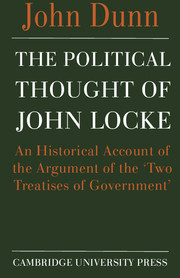 The Political Thought of John Locke
The Political Thought of John Locke 1 - Introduction: John Locke in History: The Problems
Published online by Cambridge University Press: 05 April 2012
Summary
In the portrait gallery of history, Locke is a man who has worn many faces. In the studies of professional historians and philosophers these faces still remain discrete—so many masks. No simple story will draw them together or fit them to the single man whose refracted image they all must be. There are so many clear analyses of the different roles—only begetter of the Enlightenment, self-conscious and dedicated ideologist of the rising bourgeoisie, greatest of the exponents of English liberal constitutionalism, kept intellectual, freethinker turned dévot, majoritarian populist, most shifty and esoteric of the treasonous clerks. Some of these place him as a key figure in a story which reveals the hidden truth of European history. But the hidden truths, whether Whig, Marxist, or Straussian, are only mechanistic superstitions, models as inept to explain the microcosm of John Locke as they are the macrocosm of the ‘Historical Process’. Others are more simply biographical. Yet these, too, seem more arbitrary abridgements of a complexity than analytic simplifications of one: still others are merely false.
The account which is given here of Locke's political doctrines is not, it is hoped, of any of these types. It is indeed analytical in ambition. But it is intended as an attempt to explain what needs explanation—to present an intelligible account of one facet of one man's intellectual experience, however vulgar; to elucidate why it was that Locke said what he said, wrote what he wrote, and published what he published in the Two Treatises of Government.
- Type
- Chapter
- Information
- The Political Thought of John LockeAn Historical Account of the Argument of the 'Two Treatises of Government', pp. 5 - 10Publisher: Cambridge University PressPrint publication year: 1969


